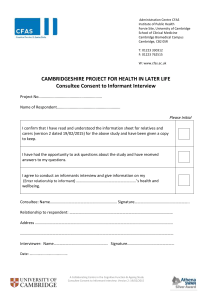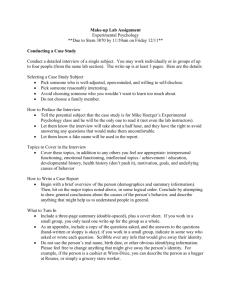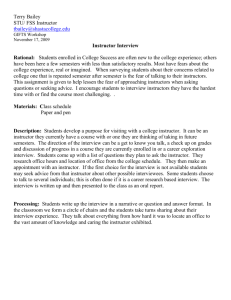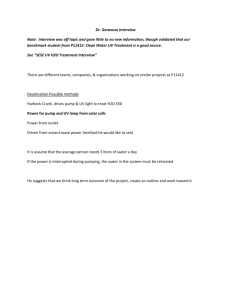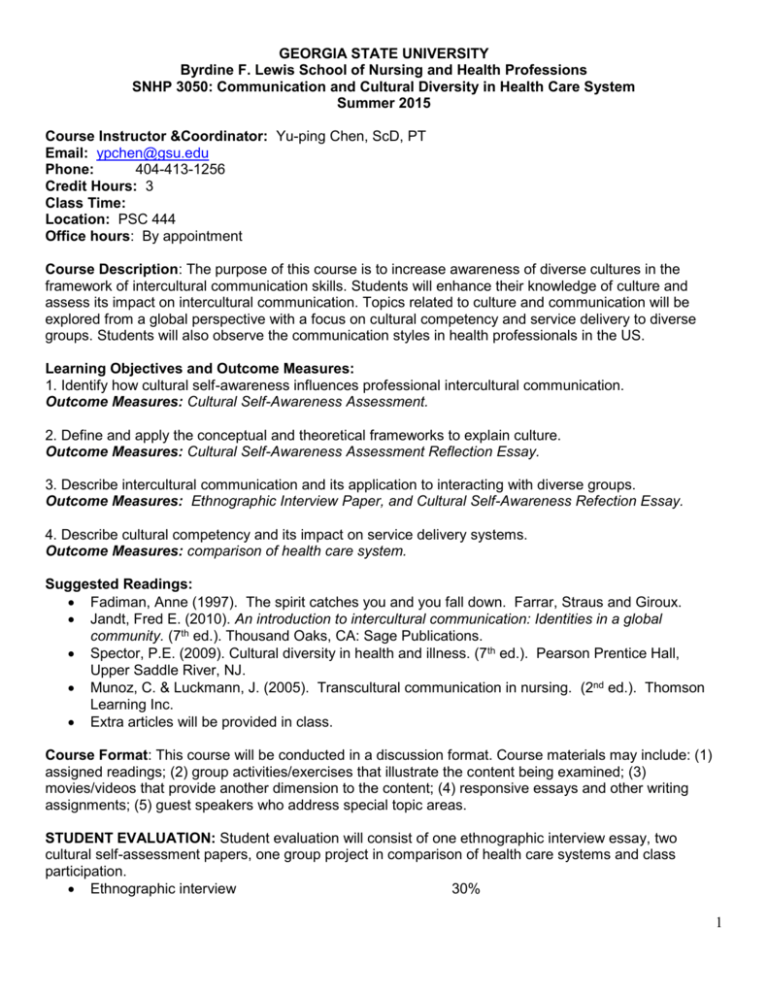
GEORGIA STATE UNIVERSITY
Byrdine F. Lewis School of Nursing and Health Professions
SNHP 3050: Communication and Cultural Diversity in Health Care System
Summer 2015
Course Instructor &Coordinator: Yu-ping Chen, ScD, PT
Email: ypchen@gsu.edu
Phone:
404-413-1256
Credit Hours: 3
Class Time:
Location: PSC 444
Office hours: By appointment
Course Description: The purpose of this course is to increase awareness of diverse cultures in the
framework of intercultural communication skills. Students will enhance their knowledge of culture and
assess its impact on intercultural communication. Topics related to culture and communication will be
explored from a global perspective with a focus on cultural competency and service delivery to diverse
groups. Students will also observe the communication styles in health professionals in the US.
Learning Objectives and Outcome Measures:
1. Identify how cultural self-awareness influences professional intercultural communication.
Outcome Measures: Cultural Self-Awareness Assessment.
2. Define and apply the conceptual and theoretical frameworks to explain culture.
Outcome Measures: Cultural Self-Awareness Assessment Reflection Essay.
3. Describe intercultural communication and its application to interacting with diverse groups.
Outcome Measures: Ethnographic Interview Paper, and Cultural Self-Awareness Refection Essay.
4. Describe cultural competency and its impact on service delivery systems.
Outcome Measures: comparison of health care system.
Suggested Readings:
Fadiman, Anne (1997). The spirit catches you and you fall down. Farrar, Straus and Giroux.
Jandt, Fred E. (2010). An introduction to intercultural communication: Identities in a global
community. (7th ed.). Thousand Oaks, CA: Sage Publications.
Spector, P.E. (2009). Cultural diversity in health and illness. (7th ed.). Pearson Prentice Hall,
Upper Saddle River, NJ.
Munoz, C. & Luckmann, J. (2005). Transcultural communication in nursing. (2nd ed.). Thomson
Learning Inc.
Extra articles will be provided in class.
Course Format: This course will be conducted in a discussion format. Course materials may include: (1)
assigned readings; (2) group activities/exercises that illustrate the content being examined; (3)
movies/videos that provide another dimension to the content; (4) responsive essays and other writing
assignments; (5) guest speakers who address special topic areas.
STUDENT EVALUATION: Student evaluation will consist of one ethnographic interview essay, two
cultural self-assessment papers, one group project in comparison of health care systems and class
participation.
Ethnographic interview
30%
1
Cultural self-assessment
Comparison of health care systems
Class participation
Total
30%
30%
10%
100%
Grading System:
Letter grades will be determined as follows:
A
90-100%
B+
85-89%
B
80-84%
C+
77-79%
C
70-76%
D
60-69%
F
< 60%
Course Expectations:
Class attendance: Class attendance and participation are required. If you notify the course instructor that
you will not be present for an acceptable reason every effort will be made to assist you in your make-up
efforts. If the course instructor is not notified properly or your absence is unexcused, you will be
responsible for obtaining the material independently and proper persons will be informed.
Classroom Mission Statement: The mission of our classroom is to collaborate as a team to facilitate the
active learning and integration of material in a professional, non-threatening, non-intimidating
environment.
Note Taking: Note taking is essential to reinforce knowledge and comprehension of lecture material
being presented and to supplement class handouts. Power point presentations may or may not be
available for each class session; therefore, it is essential to pay attention and to take appropriate notes.
Notes should then be compared to assigned readings to fill in the gaps of knowledge and comprehension
to facilitate application, analysis, synthesis and evaluation of lecture and lab material.
ACADEMIC CONDUCT AND POLICIES:
The code of academic conduct is outlined in the departmental and university student handbooks.
Violations of academic honesty policies include plagiarism, cheating on examinations, unauthorized
collaboration, falsification and multiple submissions. Students, who have any questions or need further
clarification on these policies, should see the instructor prior to turning in an exam or project.
Academic Honesty: All students at this University are expected to engage in academic pursuits on their
own with complete honesty and integrity. Any student found guilty of dishonesty in any phase of
academic work will be subject to disciplinary action. Students should read the current Georgia State
University Graduate Catalog to review policies on Academic Honesty.
Teaching Methods and Learning Experiences: This is a course utilizing a variety of learning
experiences including lecture, discussions, case study projects, and case-based problem solving.
Learning experiences include presentations of related applications, presentations and projects.
ASSIGNMENTS:
A. Cultural Self-Awareness Assessment and Reflection Essay (30%): First essay due (7/13); Second
essay due (7/28)
2
Students will engage in a discussion about the importance of cultural self-awareness and its influence on
their intercultural communication skills. Students will use the Personal Report of Intercultural
Communication Apprehension (PRICA), an instrument which measures ones feelings about
communication with people from other cultures to assess their cultural self-awareness. The PRICA will
serve as a pre and post assessment and therefore will be completed at the beginning and end of the
semester. In addition, to completing the self-awareness instrument, students will write a 2 double-spaced
pages, 2 pages maximum reflection essay. Separate reflection essays will be written for the pre and
post assessment. In Essay #1 students will reflect on where they are in terms of their own cultural selfawareness. Students must also reflect on their score from the PRICA and discuss whether their score
was a “surprise” and why they believe they feel that way. All of the possible factors caused the result
need to be analyzed. Students will use Essay #2 to reflect on whether any of their perceptions and
assumptions about cultural self-awareness and intercultural communication has changed since the
beginning of the course and discuss how they will use what they learned in their future career or
profession. Students will retake the PRICA and integrate their score into this essay.
B. Comparison of health care systems between special groups (30%): Group Presentation; due 7/27
Students will work in small groups (assigned by instructor) to create a culturally competent agency based
on course content and cultural competency articles. Groups will choose a health-related problem (i.e.
homelessness, substance abuse/addition, chronic health conditions) that impacts the functioning of a
diverse or marginalized group (i.e. women, mentally challenged, physically challenged, race/ethnicity, low
income, gay, lesbian transgender).
The main objective of this assignment is to design a mechanism for service delivery that will help alleviate
the impacted group’s health-related problem and improve human functioning. You should highlight the
agency’s type (i.e. community-based, not/for profit, government), mission, organizational structure, ethics,
service delivery policies (how will clients be referred to agency, assessed for services and terminated),
payment structure, and model of cultural competency. Students will use power point and other creative tools
to showcase their agency in a 40 minutes class presentation. More information about the format of the
presentation will be provided during class sessions.
1. The group will have 40 minutes to present (instructor will call “time” when the 40 minutes is reached and
presenters should be seated.
2. Students are expected to be as creative and interesting as possible with this assignment.
3. Each group member is required to speak as part of the presentation.
4. Handouts are not required but would be helpful for your classmates and the instructor.
5. This is a GROUP project with a group grade. You are expected to work together as a group, each
group member contributing to this presentation. Any concerns about one person’s contribution may require
a group meeting with the instructor and affect the group’s final grade.
6. Be sure to outline, designate, and plan accordingly for the assignment. This is a significant portion of your
grade.
7. The final grade for the project will be derived by: Professor’s rating of the group presentation (40%),
group members rating of each others’ contributions to the project (30%), and peers rating of the group
presentation (30%).
C. Ethonographic interview presentation (30%): due 7/22
Ethnography is the direct observation, reporting, and evaluation of the customary behavior of a culture. As
the preferred research method of cultural anthropologist, ethnography allows the researcher to learn directly
from the individuals they are studying. The objective of this assignment is threefold: (1) to develop an
3
understanding of ethnography and its relationship to culture and communication (2) to develop a
comprehensive insight of another culture and (3) to develop intercultural communication skills.
Procedures
1. Select and interview a person (also known as an informant) who is from a different ethnic or cultural group
than you. It is suggested that students select an informant who has been in this country no more than ten
years (this allows for a rich and in-depth interview). Do not select a relative or family member.
2. Research the informant’s culture before your initial meeting. Plan how you will attempt to establish
rapport. Sharing a homemade food item is often effective. Be creative and imaginative.
3. Explain to your informant that this is a class assignment.
4. Review the interview questions. Prepare both formal and informal types of questions.
5. Record your feelings, expectations, and attitudes about this assignment before you begin the actual
interview.
6. Remember to treat your informant with respect. They are doing you a favor. One way to show respect is
to avoid controversial topics.
7. Determine how you will compensate your informant. Seek out a culturally acceptable form such as buying
them a soft drink or cup of coffee.
8. Proceed with the interview. Record questions and responses. You can take written notes, tape or video
record the experience – but develop a strategy after consulting with the informant.
Pre-interview and Post-interview Questions (to be integrated into the final paper)
1. BEFORE you meet the informant, record your feelings, expectations, and attitudes about the pending
interview and describe how you prepared for the experience.
2. AFTER the interview, report how the interview went:
a. Describe how you explained yourself. Describe the general tenor of the experience from
the beginning to the end. Did the conversation flow smoothly? Be candid and specific.
b. Describe how the informant responded to you.
c. Describe how you compensated the informant.
d. Describe what lessons this interview taught you and what lessons you would share with
others about interviewing someone from another culture.
Types of Specific Questions
1. Find out how the informant’s first impressions of this culture (and its people) were shaped.
a. Inquire whether friends (or family) preceded the informant to this culture.
b. Ask whether the media (for example, TV, movies) influenced the informant’s perceptions
of this culture before and after his or her arrival.
c. Ask about the role of the advertising media in the decision to immigrate.
d. Explore how the informant’s views were shaped by her or his experiences at the port of
entry (airport, train or bus stations.
2. Ask about what the informant misses most from her or his original culture.
3. Ask the informant what intercultural communication barrier(s) have had the greatest impact on her or his
move to this country. For example, have they experienced anxiety, racism, discrimination, ethnocentrism,
language, verbal /non-verbal communication (attempt to elicit specific examples).
4. Explore cultural attitudes and cultural customs with your informant.
Guidelines for Conducting the Interview
1. Be as objective as possible and continually check your own cultural bias. Avoid ethnocentrism.
2. Do not challenge the informant’s “correctness of thinking”, especially when she or he is making
observations about aspects of your culture.
3. Avoid questions of personal nature.
4. Frequently ask for clarification if you do not understand a point being made.
5. Be willing to ask for a second meeting to clarify and follow up on specific points.
Make-Up Policy:
4
There will be no make-up examinations. If you miss an exam you will lose those points toward your final
grade. Missing the final exam will result in a failing grade for this course. The instructor may override this
policy if a catastrophic event should occur.
Course Changes:
This course syllabus provides a general plan for the course. Deviations from the schedule are subject to
occur and will occur as deemed necessary by the instructor.
Academic Integrity:
Students are responsible for the information contained in the Student handbook.
Accommodation For Students With Disabilities:
Students who wish to request accommodation for a disability may do so by registering with the Office of
Disability Services. Students may only be accommodated upon issuance by the Office of Disability
Services of a signed Accommodation Plan and are responsible for providing a copy of that plan to
instructors of all classes in which an accommodation is sought.” [Office of Disability Services is located in
the Student Center, Suite 230]
Class Schedule
DATE
CRN 54325 Note
1st
WK
7/6
7/8
2nd
WK
7/14
7/15
3rd
WK
7/21
7/22
4th
WK
7/27
WK
of
7/6
WK
of
7/13
1st Cultural
selfawareness
assessment
essay
due
Course overview.
Communication and culture: cultural influence
on perceptions.
U.S. cultural patterns
* 7/8 3-5PM library tour (Ms. Sharon Leslie)
Communication barriers: verbal and nonverbal
communication. (7/14: Dr. Morelli)
Dimension of culture and its influences to
health care system.
* 7/15 10-noon: Experience ‘American
students’ presentations on cultural diversity’
(PSC 439)
Communication for the specific cultural groups
Nursing communications examples (Dr. Eva
Horne: 7/22 1:00-2:30PM; Dr. Ptlene Minick:
2:30-4:00PM)
7/21 or 7/22: interview presentations
WK
of
7/20
WK
of
7/28
TOPICS
2nd Cultural
selfawareness
assessment
essay
due
Cultures within cultures.
Identity and subgroups.
7/27: Health care system presentations
READING ASSIGNMENTS & ACTIVITIES
Questions and answers
Class notes
Class notes
Group discussion
Health-related system tours: CTCA (7/13)
Health-related system tours: CHOA (7/17)
Ethnographic interview
Class notes
Group discussion
Ethnographic interview presentation
Health-related system tours: CDC museum
(7/20)
Health-related system tours: Pediatria (7/23)
Class notes
Comparison of health care system presentation
between special groups.
Group discussion
Students will be assigned to different groups based on their discipline to observe how the
professionals communicate and interact with their patients in the facilities.
5

